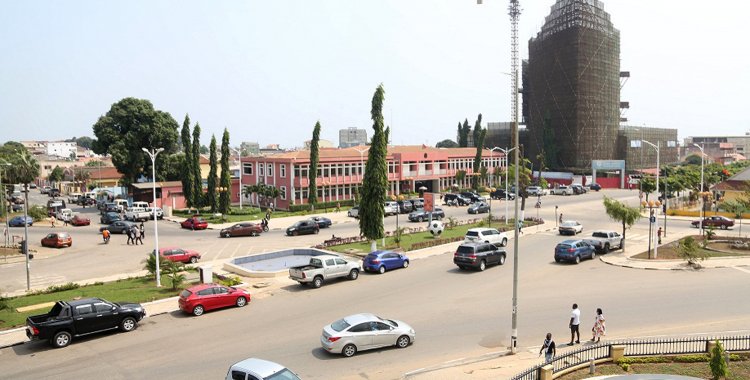According to the president of the FCD, António Bento Bembe, due to this concern, he has already had two meetings with President João Lourenço, who also expressed his concern about the state of the process.
António Bento Bembe, deputy to the National Assembly by the parliamentary group of the Popular Movement for the Liberation of Angola (MPLA), who was speaking at a press conference, informed that João Lourenço promised to form a working group to deal with the peace process in Cabinda.
"At this moment, preparations are underway to resume the matter. Despite the delay, this does not mean a lack of consideration on the matter. Within the scope of this preparation, the dialogue between the FCD and the representatives of the Government and the party is maintained [ in power], so at any time the proper treatment of the remaining issues of the memorandum of understanding for peace and reconciliation in the province of Cabinda and the application of the special statute will be resumed ", said António Bento Bembe.
Regarding the special statute for Cabinda, one of the clauses of the Memorandum of Understanding, António Bento Bembe said that the FCD presented its contribution to its inclusion in the Draft Revision Law of the Constitution of the Republic of Angola, underway in the National Assembly.
"The FCD has approached the problem with the Government and the ruling party with patience, in a sense in which the Government can take the political process of the province of Cabinda as seriously and firmly as possible, leaving the plan of ideas and going to the practical plan, as it is his competence insofar as it is he who directs the destinies of the Angolan nation ", he said.
The memorandum of understanding was signed on August 1, 2006, however, in 2009, the joint commission for its implementation, composed of members of the central government, the FCD, the Episcopal Conference of Angola and São Tomé and the Council of Churches Angolan Christians, have been paralyzed since 2009, finding themselves "in a phase of apathy", said António Bento Bembe.
According to the president of the FCD, who was once the secretary of state for human rights in Angola, shortly after the document was signed, the first steps of its implementation were taken with the integration of the forces of the Front for the Liberation of the Enclave of Cabinda ( FLEC) in the Angolan Armed Forces, the National Police, in embassies and public companies.
"The integration phase has passed and there were others for the refugee issue, but unfortunately after the FAA integration phase was over from one moment to the next, the commission for implementing the memorandum was suspended. The process has been experiencing a moment of apathy. , a stagnation, during the whole phase of the past government ", he stressed.
According to António Bento Bembe, all the problems that still exist today in Cabinda could be avoided with the proper implementation of the memorandum and its special status.
Cabinda's special statute is of political and administrative scope and aims at the socio-economic development of the province of Cabinda, which would imply changes in the province's administrative framework, explained the president of the FCD, stressing that the Government would have specific powers of the general scope .
"Taking into account the specificities of the province of Cabinda, geographic, historical and cultural, the government of Cabinda would have its own powers within the scope of these specificities. Within this framework, there were customs duties, which would not be values to be forwarded to the central government, but to earmark for the development of the province. However, we have not passed to this phase ", he said.
For the FCD, the special status claimed for the oil province of Cabinda is not resolved with the implementation of autarchies, for this reason it has already presented a proposal on how to reconcile the two issues.
António Bento Bembe guaranteed that the war in Cabinda is over, since the peace agreement was signed and a ceasefire was made.
"In fact, we have heard people who say that there is still war in Cabinda, but we call this a problem of schizophrenia (...) the people positioned to talk about war in Cabinda are the commander of the military region, General Lúcio who is in Cabinda, he never presented that report to the FAA Chief of Staff or to the President of the Republic, the governor of Cabinda province never submitted this type of report, "he said.
"Today in the province of Cabinda, there is free circulation. From the point of view of military peace, it is realized, we know that there is another level that must be pacified, the level of the hearts, feelings and minds of the people who suffer," he added, stressing that the economic and social conditions in which the people of Cabinda live are the reason for the demands.
António Bento Bembe admitted that there are still suspicions on both sides, that "the wounds are not yet fully healed", so the FCD's strategy is the way of dialogue, on the basis of wisdom.
"We have not yet left those positions that we had, I am not Angolan, these individuals from the Government are our enemies, and there are also many within the Government, the party, [who say] these Cabindas are our enemies, rebels, it is a situation that we have that knowing how to manage calmly, if we continue with turmoil, with noise, we are making the situation worse, we will never approach the solution again ", he said.
The FCD is made up of FLEC Renovada, chaired by António Bento Bembe, FLEC / FAC, then led by the late Nzita Tiago, and the Democratic Front of Cabinda (FCD), who was in charge of the organization, António Lelo, having participated at the time negotiations of the Memorandum of Understanding, members of civil society and the Diaspora.







